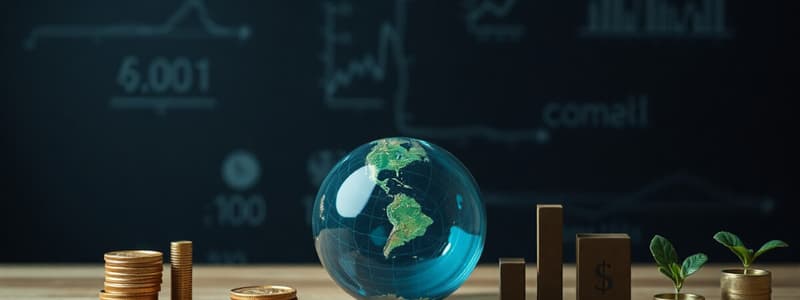Podcast
Questions and Answers
What is the primary focus of economics?
What is the primary focus of economics?
- The influence of international trade
- The decision-making processes regarding resource usage (correct)
- The production of goods in a command economy
- The study of supply and demand only
Which of the following concepts is studied in microeconomics?
Which of the following concepts is studied in microeconomics?
- Gross Domestic Product (GDP)
- Consumer behavior (correct)
- Inflation rates
- Unemployment levels
What does the Law of Demand state?
What does the Law of Demand state?
- As price increases, demand decreases (correct)
- As prices increase, demand increases
- Demand is constant regardless of price
- Demand is determined only by consumer sentiment
What characterizes a monopoly?
What characterizes a monopoly?
Which of the following is an example of fiscal policy?
Which of the following is an example of fiscal policy?
Comparative advantage refers to?
Comparative advantage refers to?
Which of the following best defines an oligopoly?
Which of the following best defines an oligopoly?
What measurement indicates the total value of goods and services produced in a country?
What measurement indicates the total value of goods and services produced in a country?
Flashcards are hidden until you start studying
Study Notes
Key Concepts in Economics
1. Definition of Economics
- Study of how individuals, businesses, and societies use limited resources.
- Focuses on decision-making processes regarding production, distribution, and consumption.
2. Microeconomics vs. Macroeconomics
- Microeconomics: Examines individual and business behavior in decision-making.
- Key concepts: supply and demand, market structures, consumer behavior.
- Macroeconomics: Studies the economy as a whole.
- Key concepts: inflation, unemployment, GDP, and fiscal policies.
3. Basic Economic Principles
- Scarcity: Limited resources vs. unlimited wants.
- Opportunity Cost: The cost of choosing one option over another.
- Supply and Demand:
- Law of Demand: As price decreases, demand increases (and vice versa).
- Law of Supply: As price increases, supply increases (and vice versa).
4. Types of Economic Systems
- Market Economy: Decisions made by supply and demand (capitalism).
- Command Economy: Central authority makes economic decisions (socialism/communism).
- Mixed Economy: Combination of market and command economies.
5. Economic Indicators
- Gross Domestic Product (GDP): Total value of goods/services produced in a country.
- Unemployment Rate: Percentage of the labor force that is unemployed.
- Inflation Rate: Rate at which the general level of prices for goods/services rises.
6. Market Structures
- Perfect Competition: Many sellers, identical products, easy entry.
- Monopoly: One seller dominates market, unique product, high barriers to entry.
- Oligopoly: Few sellers, differentiated products, interdependent pricing.
- Monopolistic Competition: Many sellers, differentiated products, some price control.
7. Government Intervention
- Taxes and Subsidies: Influence resource allocation and market behavior.
- Regulations: Laws to correct market failures (e.g., monopolies, externalities).
- Fiscal Policy: Government spending and tax policies to influence the economy.
- Monetary Policy: Control of the money supply and interest rates by central banks.
8. International Economics
- Trade: Exchange of goods/services across borders.
- Comparative Advantage: Ability to produce a good at a lower opportunity cost than others.
- Balance of Payments: Record of all financial transactions made between residents of a country and the rest of the world.
9. Key Economic Theories
- Classical Economics: Belief in free markets and minimal government intervention.
- Keynesian Economics: Emphasizes the role of government in managing economic cycles.
- Monetarism: Focuses on controlling the money supply to regulate the economy.
10. Current Economic Issues
- Globalization and its impact on local economies.
- Income inequality and economic mobility.
- Effects of technology on labor markets and productivity.
These notes provide a foundational understanding of economics, emphasizing essential theories, indicators, structures, and current challenges.
Definition of Economics
- Studies resource allocation by individuals, businesses, and societies.
- Focuses on production, distribution, and consumption decision-making.
Microeconomics vs. Macroeconomics
- Microeconomics: Analyzes individual/business decisions; covers supply/demand, market structures, consumer behavior.
- Macroeconomics: Studies the overall economy; addresses inflation, unemployment, GDP, and fiscal policies.
Basic Economic Principles
- Scarcity: Limited resources meet unlimited wants.
- Opportunity Cost: Value of the next best alternative forgone when making a choice.
- Supply and Demand: Demand increases as price decreases, and supply increases as price increases.
Types of Economic Systems
- Market Economy: Resource allocation based on supply and demand (capitalism).
- Command Economy: Centralized control of resource allocation (socialism/communism).
- Mixed Economy: Blends market and command economy elements.
Economic Indicators
- GDP (Gross Domestic Product): Total value of goods and services produced within a country's borders.
- Unemployment Rate: Percentage of the workforce actively seeking employment but unable to find it.
- Inflation Rate: The rate at which the general level of prices for goods and services are rising.
Market Structures
- Perfect Competition: Numerous sellers offer identical products with easy market entry.
- Monopoly: A single seller dominates the market with a unique product and high barriers to entry.
- Oligopoly: A few sellers control the market, often with differentiated products and interdependent pricing strategies.
- Monopolistic Competition: Many sellers offer differentiated products, allowing some control over pricing.
Government Intervention
- Taxes and Subsidies: Used to influence resource allocation and market behavior.
- Regulations: Laws designed to correct market failures (e.g., monopolies, externalities).
- Fiscal Policy: Government spending and taxation policies to manage the economy.
- Monetary Policy: Central banks' control over the money supply and interest rates.
International Economics
- Trade: Exchange of goods and services across national borders.
- Comparative Advantage: Ability of a country to produce a good at a lower opportunity cost than another.
- Balance of Payments: Records all financial transactions between a country and the rest of the world.
Key Economic Theories
- Classical Economics: Emphasizes free markets and limited government intervention.
- Keynesian Economics: Highlights the government's role in managing economic cycles.
- Monetarism: Focuses on controlling the money supply to stabilize the economy.
Current Economic Issues
- Globalization's effects on local economies.
- Income inequality and economic mobility.
- Technology's impact on labor markets and productivity.
Studying That Suits You
Use AI to generate personalized quizzes and flashcards to suit your learning preferences.




